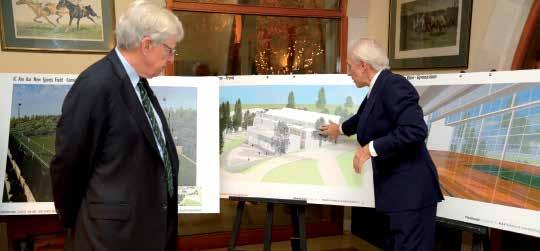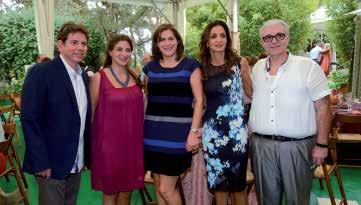
5 minute read
The Adventures of Alexander MacLachlan Smyrna (Part XII The 16th President of AUB:
The Adventures of Alexander MacLachlan:
Alexander MacLachlan
Greek students performing Sophocles
Group of IC students: tensions were increasing between Greek and Turkish students
On November 10, 1912, guests at a dinner party in number 11, Downing Street were deep in conversation about Turkish affairs. The host, the Chancellor of the Exchequer and future UK Prime minister, David Lloyd George, was revealing his strong passion for Greece. His words were music to the ears of London’s Greek consul, John Stavridi. The Balkan war was well underway and, for more than a month now, Greece and her allies had been at war with Turkey, with the Greek army defeating the Turks in several major battles. “May the Turk be sent out of Europe and sent to [expletive] where he came from,” Lloyd George toasted with his guests. Stavridi quickly sent word to Greece’s Premier, Eleftherios Venizelos, who immediately came to London to meet with Lloyd George. In the Chancellor, Venizelos found the perfect champion and ally. The “Megali idea” came into effect: A greater Greece which would be forcibly formed by including large portions of Asia Minor. It was a partnership which would eventually lead to the destruction of Smyrna….

Protestant Minister Rev. Alexander MacLachlan was still reveling in the successful inauguration of the new IC campus in Paradise when, barely six weeks later, tensions began increasing between Turkish and Greek students. MacLachlan kept a wary eye on them. Each student body had their own respective Literary Society. Fearing that the meetings may turn into political arenas, MacLachlan assigned a professor to attend all meetings.
At the beginning, all seemed well. The Greek Literary Society announced that “Homerus” will be discussed during their Monday meetings at 4:15 pm and urged
Smyrna (Part XII)
all Greek students to join the club. For their part, the Armenian Literary Society announced that they will be discussing “Ararat”.
Shortly after, MacLachlan found out that the students of the Greek Literary Society were collecting money to go towards purchasing a destroyer for the Greek Navy.
It was a difficult spot to be in. If he shut down their Society, he will be perceived as anti-Greek. But if he let it continue, he will be labeled as anti-Turk. After some deliberation, he announced at the next morning Chapel prayers that all literary societies will be shut down. He cited his reason: in these turbulent times, students may prefer to discuss politics in these meetings when they should be concentrating on their studies.
The Greek students had a fit. The very same evening they presented MacLachlan with a written ultimatum signed by 125 Greek students: reinstate the Literary Societies or they will march out of the school. They demanded that MacLachlan renounce his decision in Chapel the following morning.
“There, of course,” he wrote in his 1937 memoires, Potpourri of Sidelights and Shadows from Turkey, “could be no question as to our attitude towards such a demand.”
MacLachlan seemed unperturbed the next morning as he conducted the usual morning services. At the end of prayers, the Minister dismissed all the students except the Greek ones. After a few minutes, he dismissed the Greek preparatory boys. Remaining were the college age students (secondary school). These were the ones who were behind the trouble and who had signed the ultimatum.
In a fatherly tone of voice, MacLachlan explained that the campus was not a prison house and the gates were wide open. After a few minutes of “firm but kind” advice, he asked for a show of hands from those who intended to carry out their threat.
There was complete silence. No hand was raised.
And then, a few seconds later,
Archbishop Chrysostomos Kalafatis
one student raised his hand. Another followed. And another. Soon most of the boys had raised their hand.
MacLachlan calmly dismissed them from the campus. Some 120 students silently marched out of the campus and made their way to the city center directly to the Greek Metropolitan Archbishop’s Palace.
For his part, Archbishop Chrysostomos Kalafatis, who had always enjoyed good relations with MacLachlan, apparently talked some sense into some of the boys. Before the day was over, twenty students repented and returned to campus and were immediately reinstated. The rest never did return yet many ran into MacLachlan years later and confessed their folly to him.
Meanwhile, in Smyrna, residents were continuing to enjoy the vivacity of the city’s active social life. As was the norm, afternoon teas, dances and clubhouse activities continued gaily throughout the spring of 1914. Italian operettas dominated the Alhambra garden theatre. The elite Levantine families seemed unaware of the troubles around them. But as spring was ending, life in the glittering city would come to a sudden halt when thousands of refugees fleeing in panic from the Balkan wars arrived in Smyrna and were bent on revenge. Their target would ultimately become the Greek communities living in the area.
As for the kindly Archbishop Chrysostomos, he was gruesomely killed only eight years later by a lynch mob at the end of the Greco-Turkish war. He was survived by his orphaned nephew who witnessed the execution. The nephew managed to escape to Lebanon where he remained. (His grandson is Michel Elefteriades, a well-known Greek-Lebanese artist and producer).
In 1992, Archbishop Chrysostomos was declared a martyr and a saint of the Eastern Orthodox Church and is today known as the Saint Chrysostomos the New-Hieromartyr of Smyrna.
To be continued…
Historical information based on: an interview with Dr. Howard Reed (summer 2011); Potpourri of Sidelights and Shadows from Turkey, by Alexander MacLachlan, 1937; Paradise Lost, by Giles Milton; Between the Great Idea and Kemalism: The YMCA at Izmiri in the 1920s, by Samuel David Lenser: A thesis submitted in partial fulfillment of the requirements for the degree of Master of Arts in History, Boise State University, August 2001; Campus Notes, November 1913, Vol I, No 1 International College, Smyrna Turkey











